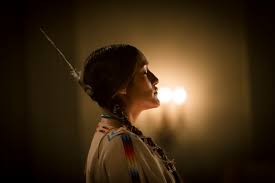Eye For Film >> Movies >> Te Ata (2017) Film Review
Te Ata
Reviewed by: Jennie Kermode

In 1895, when Mary Frances Thompson (later to be known as Te Ata) was born, official US policy still considered Chickasaw people like her to be savages. Ever more draconian laws were being passed to strip away connections with their traditions in the hope of 'civilising' them. Already crushed under a heavy burden of debt and loss of resources, most of those affected felt unable to offer serious resistance. Te Ata was different, and would use her artistic skill to transform attitudes throughout Anglo-American society. A small town girl whose parents had small town aspirations for her, she would become one of the saviours of indigenous American culture.
Of course, being a legend among Native Americans doesn't mean white people will know who you are. Though she moved in influential circles in her time and remains a celebrated figure in Oklahoma, and though she was briefly featured in 2012's Hyde Park On Hudson, Te Ata did not really have the kind of lasting popularity likely to make Hollywood sit up and take notice. With this in mind, the Chickasaw Nation spent years raising money so that it could produce a biopic about her for itself. The result is a film that, ironically, makes use of every Hollywood cliché, but it is a film of considerable importance whose by-the-numbers approah may in fact be just what's needed to break down barriers.

Q'orianka Kilcher, best known for her performance as Pocahontas in Terrence Malick's The New World, bears a striking physical resemblance to Te Ata and, despite being 26, perfectly captures the fragility of a young woman just emerrging from adolescence, as she is when we first meet her. She's a quiet, outdoorsy kind of girl, but all that changes when she wins the chance to study at a prestigious school and discovers the thrill of the stage. Though everyone else there is white she meets with more curiosity than hostility, forming firm friendships and gaining the support of a teacher who recognises her talent. It's a taste of a world far beyond what she knew, and it sparks within her the desire for much, much more.
Focused entirely on Te Ata's youth, the film follows her through the early period in which she established her career. Emotive scenes of talking about wishes, doubting herself when faced with disappointment, and boldly facing down opposition carry us along the familiar path of historical drama. The cinematography is suitably beautiful, the locations suitably grand, and great attention has been paid to every detail when it comes to costume. There's also a romance full of sighing and inspirational exchanges, but Kilcher's performance gives Te Ata a dignity that keeps her story interesting in its own right. She's a spirited, engaging heroine, the more so because we see what it's costing her each time she faces rejection, each time she has to be brave.
Despite the inescapable subtext of racial politics, the film remains centred on Te Ata's personal journey, giving more power to the subtle forms of prejudice and exclusion she faces along the way. Only once do we see her forced to confront head on the way that mainstream white America sees people like her, in a scene featuring cartoons which older viewers may have laughed at themselves as children. Her understated response is heartbreaking. It also provides context for the process of her finding her voice as an artist, giving her later performances an edge that helps them achieve something closer to the impact the originals must have had.
With capable supporting performances all round, this is a solidly produced film. It's particularly strong in its depictions of friendship between young women, something that helps to give it a more distinctive character. If you enjoy period cinema or have an interest in US cultural history, it's well worth your time.
Reviewed on: 10 Oct 2017














